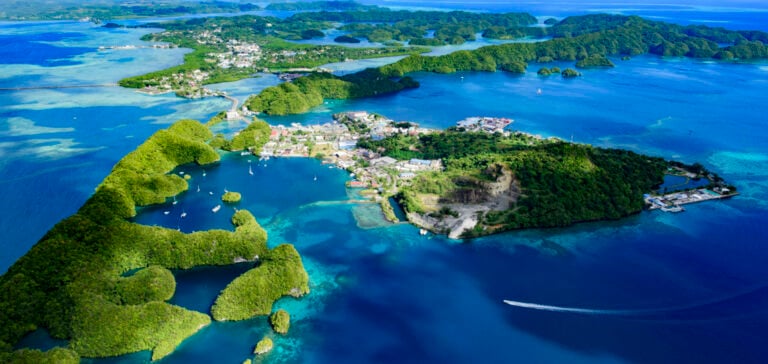The solidarity of 32 island nations, from Micronesia to powers such as Japan, New Zealand and the UK, is an inspiring example of international collaboration in the face of the challenges of climate change. On October 11, 2023, these nations signed a joint declaration to “strengthen their solidarity” in the face of the growing threats posed by climate change, particularly rising sea levels. This initiative, which came out of the Forum of Archipelagic and Island States, is of crucial importance to these vulnerable nations.
Principles of Solidarity and Equality
Indonesian President Joko Widodo, host of the event, stressed the importance of the principles of solidarity, equality and inclusion as a common basis for cooperation between these diverse nations. This joint declaration, consulted by AFP, calls for priority to be given to mitigating climate change, adapting to disasters, and protecting the marine environment.
The island nations of the Pacific and beyond are facing an existential threat from climate change. Rising sea levels threaten to submerge land and displace populations. These nations, among the most vulnerable to the effects of climate change, have felt the urgent need to join forces to tackle this crisis.
The challenges of rising sea levels
According to reports by the UN’s Intergovernmental Panel on Climate Change (IPCC), sea levels rose by 15 to 25 centimetres between 1900 and 2018. According to the IPCC, a temperature rise of 2°C compared to the end of the 19th century would lead to a 43-centimeter rise in sea level by 2100. For these island nations, this means loss of land, salinization of fresh waters, and the constant threat of natural disasters.
The Voice of Unity
The Bali joint declaration is a demonstration of the determination of these nations to combat these disturbing realities. By focusing on the principles of solidarity, equality and inclusion, these island nations aim to strengthen their voice on the international stage. With major powers such as Japan, New Zealand and the UK also present at the negotiating table, island nations are showing their determination not to be left behind in global climate decision-making.
Protection of the marine environment
In addition to sea-level rise, the joint declaration stresses the importance of protecting the marineenvironment. The oceans play a vital role in the global climate balance, and these island nations are particularly aware of the impact of human activities on seas and coastal areas. By promoting “good maritime governance” and sustainable economic development of the blue economy, these nations strive to reconcile conservation of the marine environment with economic development.
To formalize this initiative launched in 2018, the leaders tasked their governments with determining a roadmap aimed at establishing a charter. This charter should consolidate the commitments of island nations to climate and environmental protection. However, this is only a preliminary step, and the actual implementation of the necessary actions remains a colossal challenge.
The road to COP28
A crucial UN climate summit, COP28, will be held in Dubai in December. This meeting will be a major opportunity for island nations to make their voices heard and advocate more ambitious climate measures. With the IPCC warning that global warming will reach 1.5°C above pre-industrial levels by 2030-2035, it is imperative that concrete measures are taken to avoid the worst consequences of climate change.
The initiative taken by these island nations in Bali is a powerful example of how international solidarity and cooperation can help tackle climate change. It underlines the urgent need for action to protect vulnerable populations and the marine environment. The road to COP28 in Dubai will be a crucial test of the international community’s commitment to a more sustainable future. The island nations have issued a call to action, and now it’s time for the world to respond.






















